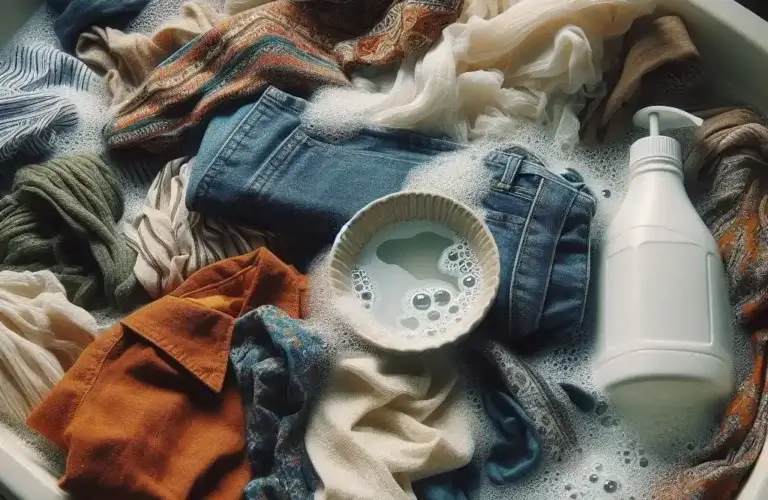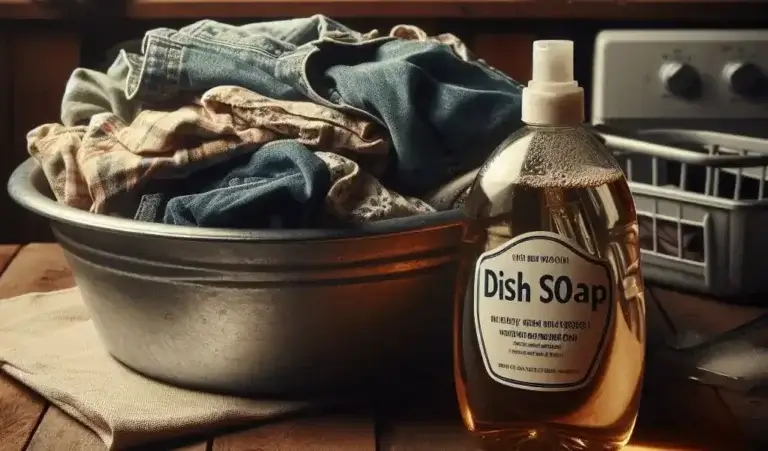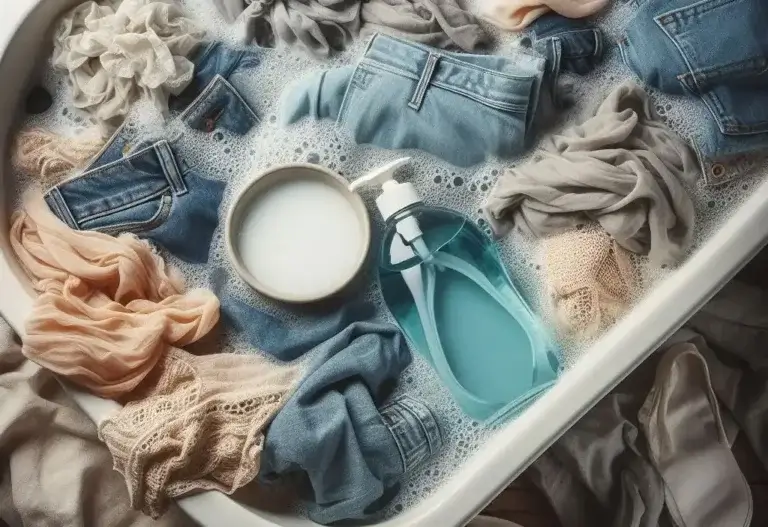Is It OK to Do Laundry in Freezing Weather? Laundry in Extreme Cold Weather
Laundry is a necessary household chore, but when freezing temperatures hit, you may wonder if running the washer and dryer is safe or effective. Extreme cold brings unique challenges that can affect your appliances and the quality of your laundry.
In this comprehensive guide, we’ll explore is it ok to do laundry in freezing weather and how cold weather impacts washers, dryers, laundry detergent, drying time, and more. You’ll get tips to prevent damage to your basement or garage, adjust wash cycles, and get better results from start to finish.
Table of Contents
How Does Freezing Weather Affect Washing Machines?
Frigid conditions can wreak havoc on washing machines in a few key ways:
- Frozen hoses – Rubber supply hoses are vulnerable to extreme cold and can crack, burst, or leak. This causes water damage and flooding.
- Damaged water valves – Most washers have internal water intake valves that control flow. Sub-zero temps can cause them to malfunction or break entirely. No water valves means no water intake.
- Power failures – Widespread cold snaps often coincide with loss of power and heat. If temperatures inside your home drop below freezing, an idle washing machine can sustain damage.
- Trapped water issues – Any water left sitting in hoses, pumps or tubs can freeze up, leading to leaks, strange noises, problems draining, and motor failure over time.
The good news? You can take preventative steps to protect your washer and avoid issues.
How To Keep Washing Machines Safe in Freezing Weather

When Old Man Winter comes calling, be proactive with these tips:
- Disconnect and drain outdoor hoses. Store them somewhere warmer until temperatures rise.
- Insulate indoor hoses and pipes with foam pipe insulation. This is quick and inexpensive protection.
- Close the water valves to washing machines when not in use. This minimizes risk if the hoses still burst.
- Leave interior doors open so warmer air can circulate to appliances.
- Run short cycles with hot water to warm the machine up if power loss is expected. The heat helps prevent frozen water deposits inside.
- Unplug the washer if you lose power. This avoids electrical issues when power is restored.
- When power returns, always check for leaks or weird noises before running a full cycle. Odd sounds can mean frozen or broken parts.
With some simple preparation, you can safeguard washers from damage and keep laundry running smoothly through the winter.
Where Should I Keep My Washing Machine in Winter?
Ideally, washing machines belong in heated indoor spaces year-round. But for households with laundries located in garages, basements, or mudrooms, winter requires adjusting.
Can you do laundry in unheated rooms when it’s freezing? Technically yes, but you’re rolling the dice each time. Here are factors to consider:
Garages
Attached garages share walls with homes, so they typically don’t drop below freezing and are relatively safe for laundry duties. Just beware of freezing temps:
- Leaky ceilings or doors that let in too much cold air
- Lengthy power failures that allow interior temps to dip dangerously low
- Water valves that could still freeze if the garage gets cold enough
Also, check appliance manuals. Most are rated to function properly down to temps as low as 45°F but warn against going below freezing.
Basements
Partially finished and insulated basements may hover above 32°F even when it’s frigid outside. If your basement stays warmer than about 40°F all winter, running the washer down there should be fine.
However, unfinished and uninsulated concrete basements are essentially outdoor spaces. Any washing machine left down there will likely sustain weather damage or freeze up entirely.
Mudrooms & Porches
Smaller auxiliary rooms connected to external home entrances provide shelter but rarely warmth. Laundry appliances in unheated mudrooms, breezeways, or porches will have the same problems as those left outside.
Bottom line: If your laundry room drops close to or below freezing for long periods, it’s best to drape appliances in insulating blankets, drain all water, and wait for warmer weather.
Is It OK to Do Laundry in Freezing Weather: The solution is Here

Laundry doesn’t stop when the temperature plummets, so proper dryer operation is key. Cold conditions can undermine drying performance in a few ways:
Ventilation Problems
Dryers work by heating air and venting moisture outside. This process depends on unobstructed airflow out of the vent. In winter, the buildup of snow, ice, and debris around outdoor vents is common and can cause issues:
- Restricted airflow – When vents freeze over or get blocked by snowdrifts, airflow is stunted. This spikes drying times and risks overheating the dryer.
- Lint accumulation – With less ventilation, more lint gets trapped inside the machine. This buildup is highly flammable and increases fire danger over time.
- Moisture damage – Poor airflow also lets moisture accumulate indoors instead of venting outside. This leads to mold, mildew, and water damage.
To maximize winter ventilation:
- Monitor and clear snow, leaves, and ice from outdoor vents frequently
- Remove lint from the vent hose and ductwork regularly
- Shorten drying cycles to reduce moisture buildup indoors
Cold Air Intake
Most dryers, being home appliances, pull air in from indoors, heat it up, then pump it outdoors. When the air in your home is very cold, dryers have to work harder to raise temps enough for proper drying.
This strains energy efficiency. It can also lead to musty lingering odors in clothes if moisture doesn’t properly vent out.
Tip: Run a space heater near the dryer inlet in extremely cold rooms. This small boost in intake air temperature helps performance.
Frozen Water Lines
Some condensing dryers require a cold water hookup to help condense internal moisture for drainage. When temperatures fall below freezing, water in hoses and valves can freeze. This stops water flow for moisture control.
Prevention tactics are the same as for washing machines:
- Insulate water lines and valves
- Drain hoses when appliances are off
- Check for odd noises or leaks upon restarting
With extra care taken to protect ventilation, airflow, and water lines, dryers can thrive even when the mercury plunges.
Does Freezing Weather Impact Laundry Detergent?
Laundry detergents and fabric care products contain mainly liquid components. When temps approach freezing, you may wonder if chilly conditions affect performance or shelf life.
Laundry Detergent Freezing Points
Most name-brand liquid detergents are formulated to resist freezing in cold temperatures. The trick is adding solutes like polyethylene glycol and ethanol to the water-based solutions. These act as antifreeze to lower the freezing point below 32°F.
As an example, Tide claims their liquid detergents won’t freeze until temps reach 5°F to 10°F. Other brands offer similar freeze protection.
The exception is all-natural and homemade liquid blends. These may start to solidify at just below freezing if they lack antifreeze agents, particularly in your refrigerator or freezer.
Laundry Detergent Effectiveness
Cold temps can start to limit cleaning performance through a couple of avenues:
- Formula thickening – While detergents won’t solidify completely in freezing weather, the consistency often gets thicker. This makes it harder for them to dissolve and penetrate fabrics effectively.
- Cold wash water – Lower water temperatures impede the chemical reactions that loosen dirt and stains from clothing. So cold washes naturally clean less effectively.
You can compensate with these easy tips:
- Store detergent somewhere warmer so it remains viscous
- Run washer hoses until hot water flows out before adding clothes
- Use extra detergent for cold washes
- Soak heavily soiled items before washing
- Upgrade to a better detergent formulated for cold water performance
Laundry Detergent Shelf Life Considerations
Does frozen laundry detergent expire faster? With most major brands, no. Since the formulas resist full freezing, cold exposure doesn’t generally impact shelf life.
However, repeatedly partial freezing and thawing in your freezer can lead to issues. can accelerate ingredient separation or formula degradation over very long periods. This applies more to homemade blends.
For store-bought detergents, the manufacturers state you can typically store them for 9 months to 5 years without significant changes in performance. Keep them somewhere temperature-controlled year-round for the best longevity.
Will My Laundry Freeze Dry Outside in Winter?
When temperatures drop below freezing paired with low humidity, hanging laundry outdoors often does dry eventually thanks to sublimation. This is where ice coverings transform straight from solid to gas, bypassing the liquid phase entirely.
However, true freeze-drying has caveats:
- It only works if the humidity stays very low. Higher atmospheric moisture lets ice remain wet on surfaces.
- Drying takes significantly longer than warmer weather, often days instead of hours.
- Stiff fabrics like denim might dry fully this way. But thinner items often stay damp at the core unless temperatures are far below freezing.
- Repeated freeze-thaw of wet fabrics can degrade them over time.
The process is unreliable for finishing most laundry. While you can experiment with hanging a few durable frozen pieces outdoors, don’t expect it to replace regular dryer usage. For best results:
- Hang laundry inside as much as possible
- Rotate items frequently inside your refrigerator so all sides get exposure.
- Place near heating vents or radiators
- Point a fan at items kept in the refrigerator or the freezer to improve air circulation.
This indoor freeze-drying works better by wicking away ambient moisture properly.
Does Hanging Laundry Indoors Work Well in Winter?
Limited daylight hours plus frigid temps outside seem to foil any attempts at air drying laundry in winter. However, with the right setup within your basement or garage, you can air dry clothes effectively indoors all winter long, despite freezing temps.
Here are tips for making it work when it’s too cold outside:
- Maximize space near heat sources – Position drying racks directly beside heating vents, radiators, or your tiled stove to utilize rising warm airflow.
- Use multiple fans for better moisture evaporation. Oscillating stand fans work well to keep air circulating.
- Stagger items so air reaches all sides. Periodically flip pieces too.
- Hang delicates on removable shower curtain rods inside bathrooms. The confined space holds heat and humidity from bathing.
- Drape towels and sheets over cabinet doors, handrails, furniture tops or sturdy hooks.
- Upgrade heating appliances in your basement or garage. if your home struggles to hold warmth in winter. Space heaters or insulated curtains improve interior air temp and drying speed.
Yes, it takes longer, but a little strategic setup makes indoor winter air drying a great zero-energy alternative.
Will My Wash Freeze Outdoors If the Power Goes Out?
It’s everyone’s nightmare – mid-washing machine cycle when blizzard conditions knock out your power. Now what? Will the tub water freeze? Can the washer withstand frigid temps?
First, if safely possible, use backup power options to run a quick rinse and spin cycle. This ejects most of the standing water, minimizing ice risk inside the drum.
Barring that, here’s what happens:
- Metal interior tubs resist freeze damage far better than hoses or valves. So tub ice alone probably won’t break the machine, although it may leak eventually once it melts.
- Any remaining Ice instead of water suds. will indeed freeze solid. This can warp or corrode interior parts over time due to expansion pressure.
- When power returns, ice may prevent proper drainage or spin cycles. You’ll need to chisel out deposits before resuming laundry.
- Electronics like control boards are vulnerable when temperatures plummet. Defects might not manifest until you go to restart the washer.
Ideally, immediately run a short hot rinse cycle using an inverter or generator if your washer is stranded mid-load without power. Avoid allowing water to sit in your refrigerator or freezer for prolonged periods in frigid conditions if possible. The meltout aftermath will be messy!
Can You Put Clothes Outside to Freeze Them Quickly in Winter?
If you’re trying to hasten trips to the dry cleaner for delicate garments, hanging them outdoors to freeze may seem convenient. However, this extreme temperature shock carries risks:
- Fabric damage – Ice crystals that form on clothes can tear delicate weaves. Once frozen wear can become stiff, misshapen, cracked, or frayed.
- Accidental dye loss – Very cold temperatures can loosen and discharge excess fabric dyes. Your items may end up bleached out or splotchy.
- Odor retention – Freezing doesn’t kill odor sources or let them fully off the gas. So clothes kept in your ice maker may not smell truly clean.
- Mold danger – Quick frozen clothes thaw damp on return indoors. Storing them wet encourages mold growth inside.
For day-to-day laundry, skip the deep freeze. Allow clothes to either fully air dry or use an indoor hanging rack to expedite ice and snow removal faster after gentle brushing.
11 Winter Laundry Tips For Frigid Weather
Don’t let Old Man Winter keep you from freshly laundered clothes. Apply these winter-specific laundry tips when temperatures nosedive:
- Wash using warm or hot water to maximize cleaning power.
- Insulate hoses and pipes leading to laundry appliances to avoid frozen ruptures.
- Rinse washer tubs before cycles run to preheat the interior and melt any ice present.
- Prevent water damage by placing leak pans under units, especially if the room may drop below freezing.
- Shorten washer cycles to use less water and allow it to drain fully every time in cold climates.
- Check dryer ducts and exterior vents routinely for blockages from snow, leaves, critters, lint or ice dams.
- Use moisture-absorbing products like condenser beads to help remove humidity from drying air faster for indoor setups.
- Upgrade to cold-formulated detergent if washed in very chilled water. Pre-soak heavily stained loads beforehand as needed.
- To limit chemical usage, consider doing laundry less often in winter. Store off-season items to reduce waste and cost.
- Have repair contact numbers handy and inspect both washer and dryer annually or semi-annually to limit winter breakdowns.
- When hanging clothes indoors to dry, use fans on low for airflow and position racks near radiators or heating vents.
Follow these tips diligently, and you can overcome old man winter’s frosty threats to year-round laundry. Stay cozy and clean no matter how low the mercury dips!
FAQs About Freezing Weather and Laundry Issues
Winter weather delivers unique laundry challenges. Get answers to common questions on how plummeting temperatures, ice, and heavy snow impact washing machines, dryers, detergents, drying times, and best practices.
Can you do laundry when it’s below freezing outside?
Yes, it’s safe to wash and dry clothes despite frigid external temps. However, special care must be taken to prevent damage to your pipes from freezing, or funky laundry issues. Be sure to insulate hoses, keep machines away from drafty spots, wipe out wash tubs pre-cycle, check vent blockages, and allow for longer drying times. With a few adjustments, laundry can continue without interruption.
What temp is too cold to do laundry?
Most washers and dryers can operate down to ambient air temperatures of 45°F safely. Performance may decline below that threshold, however. Once the interior of either appliance approaches 32°F, further usage risks frozen water lines and mechanical issues. So it’s wise to relocate laundry appliances somewhere warmer or pause operations during cold snaps until outdoor conditions improve if the room housing them can’t stay above freezing consistently.
Why is my washing machine not working in cold weather?
Sudden washer failure when temperatures dip is usually caused by frozen internal hoses, valves, or water lines. Rubber components become inflexible and often rupture. This halts water flow necessary for the wash process. Prevention involves insulating supply lines, setting washers to self-drain, checking for draftiness letting in sub-zero outdoor air, and running quick rinse cycles before extended shutdowns to remove all standing water. If your washer struggles when the mercury drops, these adjustments can get it functioning smoothly again.
Where is the best place to put a washing machine in winter?
The optimal placement for a washer during winter is fully indoor heated spaces like the basement, laundry room, bathroom, or kitchen. Temperatures in these areas generally won’t drop low enough to impede function. If kept in uninsulated secondary rooms like garages or mudrooms, take extra precautions like insulating pipes, monitoring ambient temps with a thermometer, avoiding use below freezing, and storing it against an interior wall without exterior exposure. Also, check appliance manuals for minimum air temp ratings. Most need above at least 45°F to work properly.
Why is my dryer taking so long in cold weather?
Frigid conditions often extend drying times due to a combination of factors. Colder air intake temperatures mean dryers must work harder to heat air to evaporate moisture properly. Low humidity also slows water dissipation. Outdoor vent blockages prevent proper steam exhaust. Check and clear your exterior vent regularly to restore airflow. Also, run a space heater near ventilation intakes as needed to assist. Use moisture absorbers too if drying laundry inside a garage or basement. Adjust settings to account for winter delays as well so clothes don’t over-dry.
Summary of Key Winter Laundry Tips
Be prepared for Old Man Winter with this concise list of cold weather laundry guidance:
- Insulate hoses and pipes to prevent ruptures
- Drain appliances fully after cycles complete
- Check dryer ductwork for blockages inhibiting airflow
- Use space heaters cautiously to boost intake temperatures
- Upgrade to detergent formulated for








